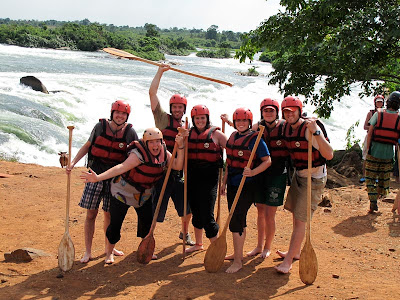We’ve all heard about how women in many parts of the world are still marginalized and considered second-class citizens; we even continue to struggle with gender equality in the United States. However, before moving to a developing country, I never really understood what it meant to be a woman in such a culture. This post will be a bit graphic, but no apologies – this is reality.
Here in Uganda, the men are definitely the decision-makers, the ones with the power. While urban areas are becoming more gender-equal than before, most people still consider women and men to hold very distinctive gender roles, with the household work left to the women but the household decisions and prestige being given to the men. Women are seen as weak, yet they are the ones doing most of the manual labor for the home, such as fetching water (jerry cans are heavy!) and firewood. The women care for the children, but if the couple ever separates, the children generally belong to the father (who never actually cares for them – he either hires someone or already has another wife). Here, there is no such thing as rape within marriage, legally or culturally. Men pay a bride price (often paid in cows or other in-kind payments), which means the man has a huge amount of leverage over his wife. While becoming less common, “marriage by abduction” does happen, in which a man kidnaps a girl who has refused to marry him and rapes her. The girl’s ‘purity’ is then ruined, and out of shame, she accepts to stay as his wife – she usually feels she has no choice, as many families and communities would disown her at this point, and few other men would want her. If a woman wants to use a condom with her partner or go for HIV testing, she is accused of sleeping around (even though it is commonplace for men to have extramarital affairs, thus putting women at risk for HIV infection from their own husbands. 42% of all new HIV infections in Uganda are intramarital).
As a female Peace Corps Volunteer, my struggle is mainly from issues of harassment. Many Ugandan women (unfortunately) have become used to sexual harassment or even assault, so consider it a normal part of life. For myself and my fellow female PCVs, however, harassment is probably one of the biggest issues we face. It can be everything from cat calls (“Hello baby!”, “I love you!”, “My size!”) and blatant inquiries for sex to sexual assault. I have never been assaulted, but several of my friends have. The emotional effects have serious consequences for us as volunteers – some are afraid to leave their houses for fear of unwanted attention or worse. I find that I avoid most Ugandan men, which is something I wish I didn’t resort to because of the potential for positive, professional relationships. Unfortunately, I’ve heard too many stories of female PCVs thinking that they have great friendships and working relationships with co-workers, only to later be propositioned for sex. I have faced very few issues in my small village – everyone knows me and respects/looks out for me. The main challenges occur when I go to bigger cities.
This post wasn’t meant to make anyone at home worry about me, but only to point out one of the biggest challenges we’re facing as PCVs and the reality of life for Ugandan women. Since this blog is supposed to be a window into my experience, I decided to share this with you. A lot of these issues were brought up in a recent 20/20 episode about the murder of a volunteer in Benin and the sexual assault and rape of other volunteers, which I watched with my training class. It prompted a several-hour discussion within our group, after which we spoke with the Country Director about our concerns and priorities (and he has responded to everything positively. I really think Peace Corps-Uganda is already doing an excellent job in being proactive about these issues). The reaction to the 20/20 episode, and our action about it, made me so proud of my fellow volunteers.
As a Peace Corps Volunteer, I’m trying to improve the lives of the girls and women around me. I’m going to start teaching life skills (such as setting life goals, communication skills, decision-making, healthy behaviors, etc.) to girls in my community soon. As a health volunteer, I’m promoting family planning options, such as condoms or birth control, to try to curb the high fertility rate of about 7 children per woman, but I believe that the only way to truly reduce family size is to empower women and give them other options in life besides having lots of children. Make sure they get a good education and are able to make their own life decisions, allowing them to pursue a career or envision a different path for themselves, and then they will probably choose to have fewer children. This opinion was solidified after reading Half the Sky by Nicholas Kristof and Sheryl WuDunn – highly recommended book. Peace Corps Volunteers in Uganda have started an annual program called Camp GLOW – Girls Leading Our World – which is a week of empowering activities for young girls which I hope to be really involved with at the end of 2011; I can even nominate girls from my village to attend. Of course, to empower women, you must involve men and change their ideas about gender roles, so ‘women empowerment’ should involve both men and women. While I won’t single-handedly change the gender roles and treatment of women in Uganda, I hope I can help improve the lives of a few women and girls around me.




















